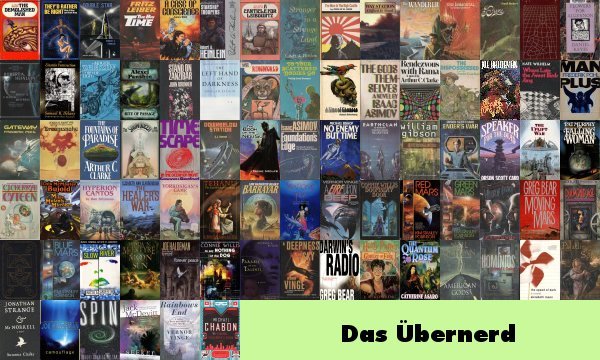 Watchmen
Watchmenby Alan Moore (writer), Dave Gibbons (illustrator), and John Higgens (colorist)
1988 Hugo Winner for Other Forms
And so we come to a unique award. 1988 was the only time that the Hugo for "Other Forms", a category intended a catch-all for works like comics and anthologies that were not appropriate for the other award categories. The fact that it hasn't been continued has been disappointing to me since there are fine efforts that are ignored but it's understandable since a such a broad category can be difficult to manage. It certainly isn't appropriate that a work dependent on the connection of both images and writing to be nominated in the regular fiction categories; it's a different art form.
So let's get to Watchmen. One of the few graphic novels to achieve mainstream success. Often cited as the greatest comic book ever made. Watchmen lives up to its reputation by featuring some sharp writing, a challenging moral quandary that gets at the heart of all heroic fiction, and a deconstructionist take on the concept of superheroes. It's been copied many times since and so it's lost a bit of its impact but it's a comic book that any comic fan should read and a work of fiction that will stand as a major achievement.
In Watchmen costumed vigilantes ran wild starting in the forties. They were normal people who for a variety of reasons (mainly psychological problems) dressed in gaudy costumes and beat up criminals. At the end of the fifties the first superhero appeared, a human who through apothesis gained effective omniscience and omnipotence. The US took advantage of having god on their side to dominate the cold war.
By the 1980's the heroes have gone away, most forced into retirement when a new law against vigilantism was passed. One of the most extreme refused to quit and when he finds that a murder victim was a vigilante who worked for the CIA he begins to suspect that someone is killing heroes. A few days later the superhero is implicated in a cancer scare and he abandons the Earth, the Soviet Union unleashes thrity years of pent up hostility, and there may be only days to find the killer before the end of civilization renders the question moot.
Perhaps the most noticeable quality to the writing is how multiple threads are constantly juggled. It's the rare panel which does not have some subtle link to what came immediately before it. This extends even to the covers of the individual issues (referred to as "chapters" in the collected form) which offer visual motifs that book end that issue and reoccur throughout. The story dances from the main thread to a greek chorus (which has it's own chorus in the form of a pirate comic) continually. It's dizzying how tightly images and words tie together with different contexts.
This would just be artistic gimmickry without a solid story to tell and Watchmen has that. The murder mystery at the heart of Watchmen is interesting but it's also wrapped up in the history of vigilantism, an omniscient viewpoint that the reader gets inside for one chapter, and some incredibly sharp dialog. Most chapters give one character a viewpoint and explore their history which come together as a sharp image in the end.
I need to also mention that Watchmen is notorious for its subversion of genre conventions. It ask what does it really mean to be a hero and what the consequences of vigilantism are. It also has one of the most chilling lines ever at the end of its penultimate chapter; anyone who has read it will remember their expectations being completely destroyed at that moment.
So it's really well written and then there's the art. Gibbons confines almost all of his page composition to a nine panel frame and then builds off of that. This tight confined space reinforces the comic book feel but it also lets him play tricks with panel continuity as each feels less like a posed action and more like a frame of a movie. In addition each tiny window is packed with enough detail to stun someone (on that note, if you can justify the expense the Absolute Watchmen edition has pages that are 50% larger letting those cramped panels really shine). And Higgin's coloring work is exceptionally moody as well despite not having access to modern coloring techniques.
There are some people who say that Watchmen is the comic book to read if you don't like comics. I think they're wrong since it is a deconstruction of the genre and the impact is lost without the cultural knowledge. It is still one of the greatest graphic novels ever done and anyone who has ever enjoyed a superhero comic should appreciate this.
